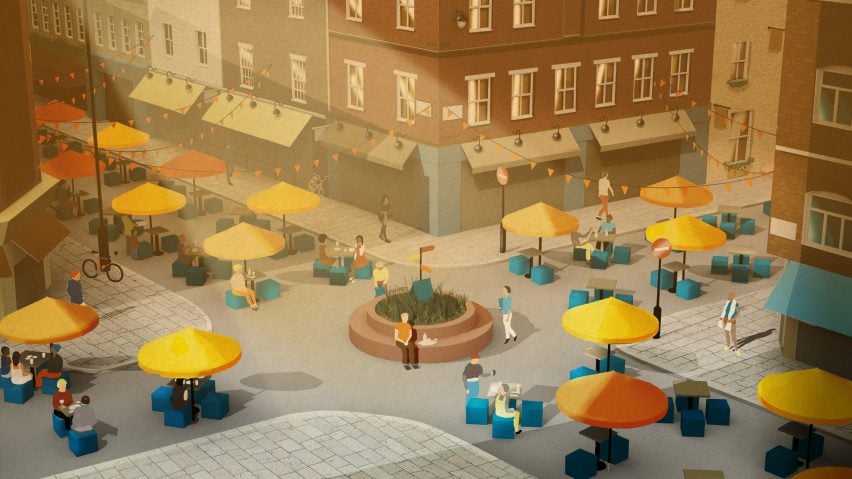As a result of social distancing rules many restaurants will have to reduce their indoor capacities when they reopen. Architect Ben Masterton-Smith believes that creating enjoyable alfresco dining areas may be key to restaurants' survival.
Masterton-Smith, who is the founder of Transit Studio, has created Social Soho – a proposal to temporarily pedestrianise pockets of London's buzzing Soho neighbourhood so that hospitality venues can "flourish again".
By closing off the roads to traffic, restaurants and bars in the area will have more outdoor floor space where guests can safely drink and dine whilst maintaining social distancing.
"These outdoor areas will ultimately be the shop window to the restaurants and bars so inevitably they will be important visually to attract their audience," Masterton-Smith told Dezeen.
"I think it is about bringing the summer to the streets with a degree of improvisation and spontaneity, but even a few plants, some colour and vibrancy can go a long way to create that."
Restaurants "don't have budgets to commit to grand designs"
Masterton-Smith designed Social Soho, after speaking with local operators, to focus on low-cost, understated ideas that could potentially be implemented by 4 July – the date set by the UK government for the reopening of restaurants and bars.
"This is really a last chance for many in the hospitality industry, so they don't have budgets to commit to grand designs outside of their restaurants," he said."We are in talks with some landlords about what some more communal spaces could look like, but there is obviously a very short timeframe to opening – and still a lack of clarity from local councils and central government on whether these are feasible or achievable."
"In spatial terms, it is still about creating enticing environments"
Masterton-Smith believes that creating enticing and safe outdoor areas is essential for attracting people into restaurants.
He suggests creating a one-way circulation route on the pavement directly in front of Soho's buildings. This would leave the pedestrianised streets completely free to accommodate seating areas shaded by colourful umbrellas, with groupings of tables and chairs placed at a distance from one another.
Alternatively, diners could sit spaced out along a banquette that runs down the centre of the street, with decorative hygiene screens or greenery used to separate sections belonging to different eateries.
"The hospitality industry is about providing hospitality, and key to this are the staff and the atmosphere they help to create," Masterton-Smith explained. "I think creativity and imagination are key to this too – about meeting the new rules and regulations in a way that is relevant and part of your restaurant atmosphere or brand."
"In terms of identity, for example, a facemask, can become another piece of uniform, so then it's a conversation about brand and identity, and making it your own," he continued.
"In spatial terms, it is still about creating enticing environments, and intimate spaces. Though that might be more challenging in the current climate, it's not impossible."
Masterton-Smith also proposed having customers dine at one long, two-metre-wide table that would be placed in the middle of the road – similar to how people sat at traditional British street parties that were hosted following the first world war.
"I think there has been a tradition of coming together after hardship, and I think after everything everyone has been through this year, including some incredible sacrifices, the idea of the communal table really resonated," he added.
Alfresco dining in UK has been held back by "little trust"
Although Social Soho was devised in a direct response to coronavirus, Masterton-Smith thinks that outdoor dining has the potential to be popular beyond the pandemic – and could even have some environmental benefits.
"I think over the last 10 years we have seen a massive increase in alfresco living and dining in the UK," he said.
"A lot of that has been so-called public space within private developments. What has been harder is to get is tables out all over London's streets, partly because there is little trust between residents, operators and the council."
"If we see anything good come out of the pandemic, I hope we can really sort out the pollution and traffic in London," he continued.
"Rather than parking one four-wheel drive on the street in Soho, you can have about 10 covers for a restaurant, so I would hope that over time there is a growth in a mindset of why we are parking outside a restaurant in the first place," he concluded.
"It's not a sensible use of space in a dense environment if we want to improve our quality of life."
Ben Masterton-Smith is one of several architects who have been considering how spaces can be adapted to suit post-pandemic life. Paul Ferro, co-founder of Form4Architecture, recently told Dezeen in an interview that cubicles will have to be installed in Silicon Valley's open-plan offices so that employees can social distance.
Roar studio has also forecasted that schools will need to have WeWork-style classrooms and repurpose non-teaching spaces like gyms and canteens to keep down student density.

